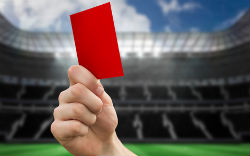Over the past several years, the Premier League has obtained blocking orders from the High Court of England and Wales, which compel ISPs in the UK to block pirate streaming services.
These so-called ‘dynamic injunctions’ are more flexible than their torrent and streaming site counterparts due to their ability to react more quickly, blocking streams as they appear close to and during match times. The idea is to frustrate customers of pirate IPTV services in particular, so that they migrate back to official offerings.
UEFA Begins to Block Pirate IPTV Streams in the UK
Back in 2017, UEFA, the governing body of football in Europe, decided that it too could benefit from this type of legal action. Following in the steps of the Premier League, UEFA obtained a similar High Court injunction that compelled ISPs including BT, Virgin, Sky and TalkTalk to block pirated match streams in the UK. The effort was expanded a year later.
Soon after, the Premier League expanded its blocking efforts to Ireland, obtaining a stream-blocking injunction against several major ISPs including Eircom, Sky, Virgin and Vodafone. This summer the league obtained permission to continue its efforts in Ireland, a path now being followed by UEFA.
UEFA Obtains High Court Order to Begin Blocking in Ireland
After a successful application to the High Court, UEFA has now been granted permission to compel several local ISPs to block access to pirated match streams during the 2020-21 season.
RTE reports that in common with the injunction obtained previously by the Premier League, Eir (Eircom), Sky Ireland Ltd, Sky Subscribers Services Ltd, Virgin Media Ireland Ltd and Vodafone Ireland Ltd are covered by the injunction. This means that they will be required to work with UEFA’s anti-piracy partners to render various IP addresses related to pirate servers inaccessible to their customers, at least during match times.
While the ISPs are now required by law to cooperate in UEFA’s blocking efforts, only Sky came out in support of UEFA’s application. While this should come as no surprise given its position as a broadcaster, companies including Virgin Media have a vested interest in stopping piracy of live games too.
As a result, the remainder of the ISPs did their part by remaining neutral, effectively guaranteeing that the injunction would be handed down, like those before it had too.
Of course, relevant issues were considered by the Court, including that such an injunction is not only necessary but not overly complicated either. Furthermore, costs of implementation must not be excessive while the interests of all affected parties – including those of Internet users – must also be respected.
However, having been down this path several times before, applicants and the courts are now very familiar with the procedure and the various parameters required to have injunctions signed off.
Blocking Injunctions Are a Well-Trodden Path
Despite their relative youth, dynamic blocking injunctions have developed quickly over the past three years but how they work from a technical perspective is a closely-guarded secret. The theory is simple; anti-piracy companies identify the broadcasting servers of pirate IPTV providers and feed these to ISPs so they can be firewalled but the precise parameters remain a closely guarded secret, albeit with some leaks.
These blocking efforts can usually be circumvented when IPTV subscribers deploy a VPN to nullify their ISPs’ blocking measures, something which is now common practice among a growing subset of IPTV subscribers. However, this year there is talk of a new state of play on the ground in respect of the Premier League’s ability to disrupt suppliers.
Precisely what is happening isn’t yet clear to us but there are reports that some IPTV providers are finding the Premier League’s efforts more intrusive than they were previously. The Premier League has already admitted that is has new powers for the coming season so time will tell who will come out on top, once the dust settles.





